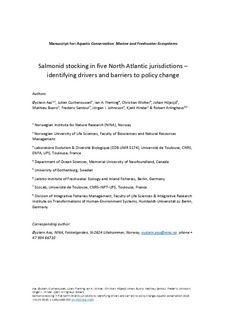| dc.description.abstract | 1. New knowledge challenges long-established practices of fish stocking and transfer because of increasing scientific consensus that the release of cultivated fish can pose risks to biodiversity; however, stocking can also improve fisheries, creating difficult decision trade-offs regarding its use. 2. Accordingly, controversy persists about fish stocking and transfer.Nostudies, how ever, have embraced a multinational perspective to understand the important gov ernance dimensions of the success and failure of salmonid stocking and transfer policies. 3. The present study has analysed the historical development and contemporary governance of the stocking and transfer of native and non-native salmonids of the genera Salmo, Salvelinus, and Oncorhynchus in five legislative units around the North Atlantic Ocean:the Atlantic Provinces of Canada, France, Germany, Norway, and Sweden. The study is based on the analyses of published and unpublished literature, and a survey of experts. 4. Current salmonid stocking policies and practices varied significantly among jurisdictions; the degree of policy change varied, from radical and rapid changes de Jure and de facto in Atlantic Canada and Norway to incremental mostly de jure changes in France and Germany. 5. Rapid policy change in Atlantic Canada, Norway, and partly in Sweden can be explained by the socio-political importance of salmonid fisheries, stocking regula tions based on policy objectives to conserve wild Atlantic salmon (Salmo solar), well-documented examples of the harmful consequences of transfers of non-native species, and well-developed vertical governance linkages. The policy changes resemble that of the 'punctuated equilibrium policy framework'. 6. By contrast, France and Germany place less socio-political emphasis on salmonids, have stocking regulations less directed at wild salmonids, more local-level decision making, more species-rich fish communities, and little evidence of adverse ecological impacts of the transfer and stocking of salmonids. This has led to small, incremental changes in stocking policy de facto that are reflective of the 'advocacy coalition policy framework'. | nb_NO |
